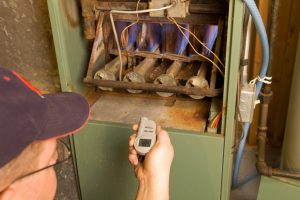
Our Top Tips For Winter Furnace Safety
As colder weather begins to set in, households all over Georgia’s Atlanta Gas & Light service area are going to start cranking up the thermostat, using more and more natural gas to keep their furnaces burning. Once you’ve locked in a cheap natural gas rate for winter, you need to make sure your home will be as safe as it is warm – here are a few of our top tips.
Know How To Identify A Natural Gas Leak
Natural gas is an incredibly popular fuel for homes in this country; more than 56 million homes in America use it to power their furnaces. It’s popular because it’s safe, clean and efficient. However, it’s also very combustible, and even a small leak can cause a devastating explosion. That’s why you and your family need to know what leaking gas smells like. If you smell the “rotten egg” stink of mercaptan, added to natural gas by distributors, then you need to leave the property immediately. Do not stop to find the leak – just get out, and call the emergency services when you’re safe.
Keep The Air Flowing To Your Gas Furnace
Your furnace works by consuming oxygen as well as natural gas. Without enough fresh air flowing into your furnace, your furnace will simply burn all the oxygen in the house and allow exhaust gasses to build up inside your home —which is dangerous if not deadly.
Modern furnaces have low temperature exhausts so PVC piping is used. Most have fresh air intakes which are usually located outside near your furnace’s exhaust pipe. The intakes are commonly pointed downwards while the exhaust pipe points straight outwards. Air intakes can sometimes become blocked by leaves or insects so it’s a good idea to check them over seasonally.
Some homes have concentric furnace vents which pull in outside air from a housing that surrounds the exhaust pipe in the middle. Again, check that both a not blocked or have anything obstructing them so that the air flows freely around them.
Test The Carbon Monoxide Alarms
Faulty gas furnaces can leak carbon monoxide into your home. This poisonous gas can kill, so be sure to keep at least one carbon monoxide alarm ready to warn of dangerous levels of CO in the atmosphere. In addition to this, you should make sure to schedule regular checkups of your home’s furnace.
A properly working gas furnace will never release CO into the air, but older, damaged or worn-out furnaces can do so – if you have an older furnace, make sure it’s regularly tested. You should consider investing in a new furnace – modern appliances are safer, and you can even save money with new natural gas appliances.
Check And Clear The Gas Furnace Filter
Some home furnaces are fitted with air filters to keep unwanted debris from entering your heating ducts. These filters need to be cleaned or replaced regularly – you should inspect them on a monthly basis, and consider replacing them if they’re in bad shape. A clogged filter prevents the hot air from circulating properly, making your furnace work harder and ultimately contributing to higher gas bills.
Make Some Space For Your Natural Gas Furnace
It’s easy for things to be left leaning against your furnace during summer. However, once the furnace is back in use, you need to clear some space around it. Anything combustible touching it creates a fire hazard, so be sure to move those coats away before turning the heating back on. You should also regularly vacuum around the furnace to prevent dust from building up – this, too, can pose a fire risk.
Keep Natural Gas Costs Down This Winter
Every home’s going to see their natural gas bills go up over winter. If you’re looking to save a little money, try some of these tips for saving on your natural gas usage. Don’t forget to shop around, too – a cheap fixed rate natural gas plan can save you a small fortune during Georgia’s colder months.